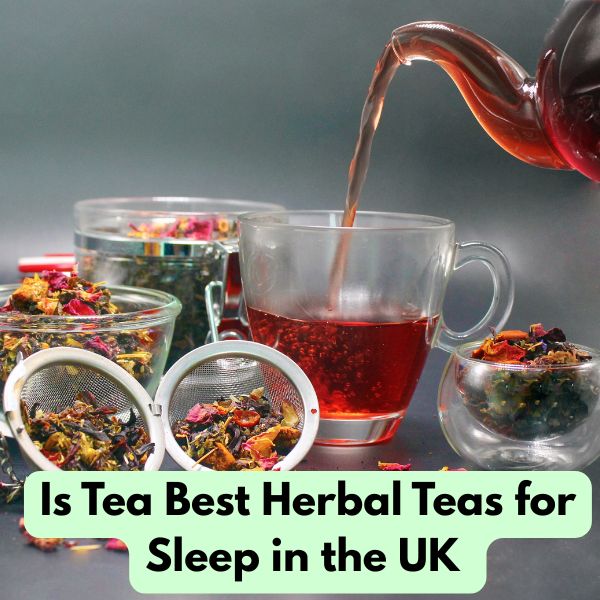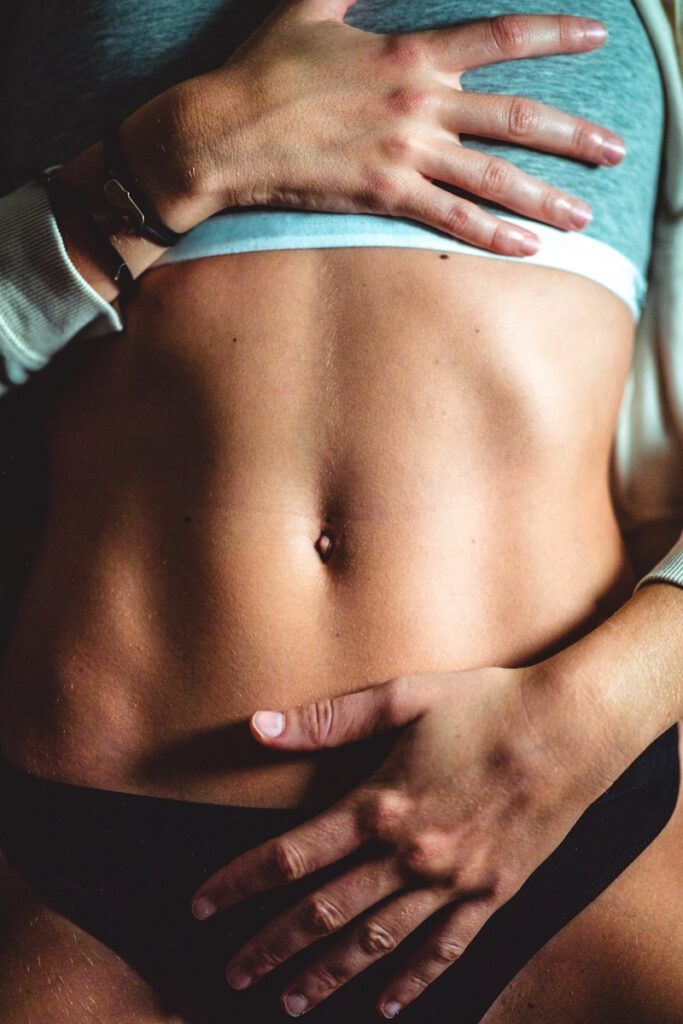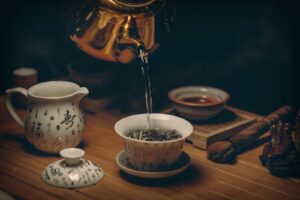Top Soothing Blends for Restful Nights
A Buyer’s Guide
If you’re having trouble sleeping, herbal tea might be just what you need. We are going to look at some of the Best Herbal Teas for Sleep in the UK.
In the UK, there are plenty of options that can help you wind down and prepare for a restful night.
With various flavors and calming properties, choosing the right herbal tea can make all the difference in your bedtime routine.
From chamomile to lavender, let’s explore the best herbal teas for sleep and how to find the perfect blend for you.
Key Takeaways
- Chamomile tea is well-known for its calming effects and is a popular choice for sleep.
- Lemon balm can help reduce anxiety and improve overall sleep quality.
- Lavender tea has soothing properties that promote relaxation and sleep.
- Look for herbal teas that are caffeine-free to avoid disrupting your sleep.
- Consider your taste preferences when choosing a herbal tea for sleep.
Best Herbal Tea For Sleep

Okay, so you’re tossing and turning, counting sheep until they’re all unionized and demanding better working conditions.
I get it. Sleep is precious, and sometimes, you need a little help from Mother Nature. That’s where herbal teas come in.
Forget those sleeping pills with the mile-long list of side effects. Let’s talk about some natural, delicious ways to drift off to dreamland.
Chamomile Tea Benefits
Chamomile.
The OG sleep tea. Seriously, your grandma probably swore by this stuff. But why does it work? Well, it’s all thanks to something called apigenin, an antioxidant that chills out your brain.
Think of it as a gentle lullaby for your nervous system.
I usually have a cup after dinner, and it really helps me unwind. It’s also super easy to find in pretty much any grocery store.
Plus, it tastes like apples and sunshine. What’s not to love?
Lemon Balm For Relaxation
Lemon balm is another great option if you’re feeling stressed and anxious. It’s got this lovely, citrusy flavor that’s really refreshing.
I like to grow my own lemon balm in the garden, and the smell alone is enough to make me feel calmer.
Studies have shown that lemon balm can help reduce anxiety and improve sleep quality. It’s often combined with other herbs, like valerian root, for an even more powerful effect.
If you’re looking for sleep-promoting teas, lemon balm is definitely one to consider.
Lavender’s Soothing Properties
Okay, so lavender might make you think of potpourri and old ladies, but hear me out. Lavender tea is seriously underrated.
That distinctive floral scent isn’t just pleasant; it’s actually therapeutic. It can help calm your nerves, lower your heart rate, and prepare you for sleep.
I like to add a few drops of lavender essential oil to my bath before drinking a cup of lavender tea. Talk about a recipe for relaxation!
Just be sure to use culinary-grade lavender if you’re making tea, and don’t overdo it – a little goes a long way.
Top Herbal Tea Brands In The UK
Okay, so you’re on the hunt for some top-notch herbal tea in the UK to help you drift off to sleep?
There are a bunch of brands out there, but some definitely stand out from the crowd.
Let’s take a look at a few that consistently get rave reviews.
Clipper Organic Infusion
Clipper is a brand that a lot of people trust, and their Organic Infusion range is pretty popular.
Their “Snore & Peace” blend is specifically designed to help you relax before bed.
It usually contains chamomile, lavender, and lemon balm – all known for their calming properties.
Plus, it’s organic, which is a nice bonus if you’re trying to avoid any weird additives.
Teapigs Chamomile Tea
Teapigs is another brand that’s well-regarded, and their chamomile tea is a solid choice.
They use whole chamomile flowers, which some people say makes a difference in the flavor and effectiveness.
It’s a simple, straightforward tea that’s great for winding down after a long day.
I’ve tried it, and it’s definitely a step up from some of the cheaper chamomile teas out there.
Twinings Superblends Sleep
Twinings is a classic brand that you can find pretty much anywhere, and they’ve got a “Superblends” range with a “Sleep” option.
This one usually includes chamomile, along with other herbs like passionflower and vanilla. It’s a decent option if you’re looking for something that’s easy to find and relatively affordable.
It’s not the fanciest tea out there, but it gets the job done.
Choosing a brand really comes down to personal preference. Some people swear by Clipper’s organic blends, while others prefer the simplicity of Teapigs or the accessibility of Twinings. It’s worth trying a few different ones to see which one works best for you and your taste buds.
Herbal Tea Ingredients To Look For
Calming Herbs
When you’re on the hunt for the perfect herbal tea to help you drift off to sleep, it’s all about knowing which herbs bring the calm.
Chamomile is a classic for a reason; it’s known for its gentle sedative effects. Then there’s lavender, with its soothing aroma and relaxing properties.
Lemon balm is another great choice; it’s been used for centuries to ease anxiety and promote sleep.
These herbs work by interacting with your nervous system, helping to slow things down and prepare you for a restful night.
Sleep-Inducing Ingredients
Beyond the usual suspects, there are some other ingredients that can really pack a punch when it comes to sleep.
Valerian root is a popular one, though its smell can be a bit strong for some.
Passionflower is another good option; it’s known for its ability to reduce anxiety and improve sleep quality.
Magnolia bark is also gaining recognition, with dietitians recommending it for its sleep-promoting qualities sleep-promoting teas.
Don’t be afraid to experiment and see what works best for you.
Avoiding Caffeine
This might seem obvious, but it’s worth repeating: make sure your herbal tea is caffeine-free! Even small amounts of caffeine can disrupt your sleep.
Check the ingredient list carefully, as some teas might have sneaky sources of caffeine, like green tea or yerba mate.
Stick to pure herbal blends to ensure you’re not accidentally sabotaging your sleep.
It’s important to remember that everyone reacts differently to different herbs. What works wonders for one person might not do much for another. Start with small doses and pay attention to how your body responds. If you have any underlying health conditions or are taking medications, it’s always a good idea to talk to your doctor before trying new herbal remedies.
How To Brew The Perfect Herbal Tea

Water Temperature
Getting the water temperature right is key for herbal teas. You don’t want to burn the delicate herbs. Generally, you’re aiming for something below boiling.
For most herbal teas, water around 200-212°F (93-100°C) is ideal. Let boiling water sit for a minute or two before pouring it over your tea. This helps to avoid a bitter taste.
Steeping Time
Steeping time is crucial. Don’t rush it! Most herbal teas need a good 5-7 minutes to fully release their flavors and beneficial compounds.
Some stronger herbs can even go longer. Check the packaging for specific instructions, but don’t be afraid to experiment to find your perfect brew.
I usually set a timer to make sure I don’t forget about it.
Enhancing Flavor
Want to take your herbal tea to the next level? There are a few tricks. Adding a slice of lemon or a bit of honey can really brighten up the flavor.
Some people like to add a pinch of ginger or a cinnamon stick for extra warmth and spice. Experiment with different combinations to find what you like best.
I’ve found that a tiny bit of fresh mint can make chamomile tea taste amazing. It’s all about finding what works for your taste buds. Don’t be afraid to get creative and try new things. You might discover your new favorite tea blend!
Health Benefits Of Herbal Tea
Stress Relief
Herbal teas are often touted for their calming effects, and for good reason. Certain herbs, like chamomile and lavender, have properties that can help reduce stress and anxiety.
I’ve found that sipping a warm cup of herbal tea in the evening really helps me unwind after a hectic day.
It’s like a little ritual that signals to my body it’s time to relax.
Digestive Aid
Many herbal teas can aid in digestion. Peppermint tea, for example, is known for its ability to soothe an upset stomach and relieve bloating.
Ginger tea can also help with nausea and indigestion. I usually drink a cup of peppermint tea after a heavy meal, and it seems to make a noticeable difference.
It’s a simple, natural way to ease digestive discomfort.
Immune Support
Some herbal teas are packed with antioxidants and vitamins that can help boost your immune system. For instance, elderberry tea is often used to fight off colds and flu.
I try to incorporate immune-boosting teas into my diet, especially during the colder months. It’s a proactive way to support my body’s natural defenses.
Drinking herbal tea is not a substitute for medical treatment, but it can be a helpful addition to a healthy lifestyle. It’s important to listen to your body and consult with a healthcare professional if you have any concerns.
Choosing The Right Herbal Tea For You
Finding the perfect herbal tea can feel like a quest, but it’s totally doable. It’s all about figuring out what you need and what you like.
Don’t be afraid to experiment a little! I mean, who knows? You might discover your new favorite bedtime ritual.
Identifying Your Needs
First off, what are you hoping to get out of your herbal tea? Are you struggling to fall asleep? Dealing with stress?
Or maybe you just want something warm and comforting before bed. Knowing your specific needs is the first step.
For example, if sleep is your main goal, you might want to focus on teas known for their calming effects, like chamomile tea benefits.
Taste Preferences
Okay, so you know what you need, but what do you like?
There’s no point in forcing yourself to drink something that tastes like dirt, even if it’s supposed to be amazing for you.
Herbal teas come in all sorts of flavors, from floral to citrusy to earthy.
Here’s a quick guide:
- Floral: Lavender, Chamomile
- Citrusy: Lemon Balm, Lemon Verbena
- Earthy: Valerian Root, Ashwagandha
If you’re not sure where to start, try getting a variety pack. That way, you can sample different flavors and see what appeals to you.
I did this and found out I actually like licorice, which I never would have guessed!
Consulting With Experts
If you’re dealing with a specific health issue, it’s always a good idea to chat with a healthcare professional or a qualified herbalist.
They can give you personalized recommendations and make sure the herbs you’re using won’t interact with any medications you’re taking.
Plus, they can offer advice on dosage and brewing methods. It’s always better to be safe than sorry, especially when it comes to your health.
They might even suggest something you hadn’t considered.
I once tried a tea that was recommended by a friend, and it turned out I was allergic to one of the ingredients. It wasn’t fun! So, yeah, definitely do your research or talk to someone who knows their stuff.
Where To Buy Herbal Tea In The UK
Finding the right place to buy your herbal tea can be almost as important as choosing the tea itself.
Luckily, the UK offers a wide range of options, from the convenience of online shopping to the charm of local shops.
Let’s explore where you can stock up on your favorite calming brews.
Online Retailers
Online retailers provide an unparalleled selection and convenience. You can browse countless brands and flavors from the comfort of your home.
Sites like Amazon and specialized tea websites offer a vast array of herbal teas, often with customer reviews to help you make informed decisions.
Plus, you can often find deals and discounts that aren’t available in brick-and-mortar stores. Don’t forget to check out subscription services for regular deliveries of your favorite blends.
For example, you can explore herbal teas at Holland & Barrett.
Local Health Stores
Local health stores are a great option if you prefer a more personal shopping experience.
These stores often carry a curated selection of high-quality herbal teas, and the staff can provide expert advice on different blends and their benefits.
You can also find organic and ethically sourced teas that may not be available in larger supermarkets.
Supporting local businesses is an added bonus!
Specialty Tea Shops
For the true tea enthusiast, specialty tea shops are a must-visit. These shops offer an unparalleled selection of herbal teas from around the world, often sourced directly from tea gardens.
The staff are incredibly knowledgeable and passionate about tea, and they can guide you through the different flavors and properties of each blend.
Many specialty tea shops also offer tea-tasting sessions, allowing you to sample different teas before you buy.
Buying herbal tea doesn’t have to be a chore. Whether you value convenience, expertise, or supporting local businesses, the UK has plenty of options to suit your needs. Take your time, explore the different retailers, and find the perfect place to stock up on your favorite calming brews.
Wrapping It Up
So there you have it! If you’re on the hunt for the best herbal teas to help you catch some Z’s, you’ve got plenty of options.
From the classic chamomile to blends like Clipper’s Snore and Peace, there’s something for everyone.
Remember, the right tea can make a big difference in your bedtime routine. Just make sure to avoid any caffeinated options if you want to sleep well.
Whether you’re sipping alone or sharing with friends, these herbal teas can be a cozy addition to your evenings.
Happy brewing, and here’s to restful nights ahead!
Frequently Asked Questions
What is the best herbal tea for sleep?
Chamomile tea is often considered the best herbal tea for sleep because it helps to calm the mind and reduce anxiety.
Are herbal teas safe to drink every night?
Yes, most herbal teas are safe to drink every night, but it’s good to check the ingredients, especially if you have allergies.
How long should I steep herbal tea for sleep?
You should steep herbal tea for about 5 to 7 minutes to get the best flavor and benefits.
Can herbal tea help with anxiety?
Yes, many herbal teas, like chamomile and lemon balm, are known for their calming effects and can help reduce anxiety.
Is it okay to add honey to herbal tea?
Absolutely! Adding honey can enhance the flavor of herbal tea and also provide additional soothing benefits.
Where can I buy herbal tea in the UK?
You can find herbal tea in local health stores, specialty tea shops, and online retailers like Amazon.







